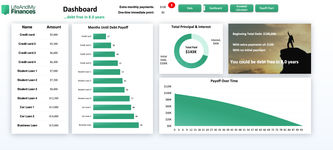Latest Debt Consolidation Guides








Our guide to debt consolidation will help you realize the financial freedom you deserve. If you're like many Americans, your credit card debt may be reaching a level where you're not as comfortable as you used to be. We have a lot of information to help you get back on track, and stay that way.
This article will provide an overview of both credit card debt as well as several statistics related to mortgages too. This information is routinely gathered on a national basis by several government agencies. While some information might seem dated, this article was refreshed in October 2020.
As of July 2020, statistics published by the Federal Reserve indicate Americans have about $985 billion in outstanding credit card debt. That works out to around $7,660 per household.
One of the reasons merchants allow customers to pay with credit cards is they don't have to worry about collecting the money charged. That burden falls on the shoulders of the card issuing company. These same companies are experts at collecting money from customers, and they don't like to settle for anything less than payment in full.
The average American carries a great deal of credit card debt, and that can sometimes lead to financial stress, payment problems, and bankruptcies. In this article, we're going to discuss some of the options individuals have to manage this potential problem.
Anyone that's been thinking about making a large purchase, such as a new home or car, might be faced with a decision that involves the purchase of credit insurance too. In this article, we're going to discuss the pros and cons of buying this insurance, as well as choices available to consumers today.
In an effort to drive down outstanding credit card balances, the Office of the Comptroller asked banks to institute new standards when calculating minimum required credit card payments. While the change resulted in higher monthly minimums for some cardholders, it's helping to lower credit card debt too.
One of the increasingly popular ways to pay for elective health care services is the medical credit card. These specialized cards offer patients the convenience of paying for medical care using a credit card that provides attractive payment terms too.
It's a great feeling to get a "bargain" when shopping. That's something all marketers hope for when offering retail credit cards to consumers. Discounts are great, but there is a down side of accepting these deals too.
In addition to using a credit card to make purchases, most offer the cardholder the convenience of a cash advance. While the process of obtaining an advance is as simple as walking up to an ATM, the cost of taking out an advance is quite high.
When it comes to debt, the Great Recession will be remembered for the turmoil created in the housing market. But the news doesn't always have to be bad. In fact, the time has never been better to reflect on past spending habits and start a plan to get out of debt.
In a down economy, this story is all too familiar. Individuals wake up one day to find themselves overwhelmed by debt. Money has been spent faster than it's coming into the household. At the extreme, the debt load is so out-of-balance that bankruptcy appears to be the only alternative.
Nearly every day there are stories in the news about the growing credit card debt problem that plagues consumers throughout America. But what if you're one of the lucky ones that have disposable income, and you're trying to figure out what to do with the extra money?
Owning a credit card is a convenient alternative to carrying cash. But these cards have their drawbacks too, especially if the desire to buy goods or services overshadows the ability to pay for them. Prepaid debit cards offer consumers both the convenience of electronic purchases, as well as protection against overspending.
The years of carrying a significant amount of cash are long gone. Paper bills and coins were replaced by credit cards, and a lot of them. Over time, the need for "specialty" cards waned as consumers decided it was time to streamline monthly payments. Today, there are really only two choices: a credit or a debit card.
Young adults are taught many things in school, but simple home economics concepts like balancing a budget are often overlooked. Without a plan, it's nearly impossible to meet the savings goals individuals and families need to reach their financial freedom.
Creating a budget is arguably the first line of defense against runaway debt. It provides the end user with a clear picture of both sources of income and household expenses.
In the first part of this two-part series, we explain how to find a spreadsheet application and provide a downloadable budget worksheet. We also walked through the first step in the process, which is identifying sources of household income.
There is one fact about money most people will agree with: There never seems to be enough of it. Paying bills can be stressful, and the lack of financial resources can strain relationships too. Fortunately, creating a budget can help families to plan their expenses and meet their monthly obligations.
When household income is greater than household expenses, it's possible to save money. On the other hand, when income is less than expenses, the household is going into debt.
It's uncomfortable to be in debt; no one likes the feeling of being out of control, especially when it comes to their personal finances. Individuals in this situation have two problems to solve: getting out of debt, and staying out too.
The loss of a loved one is never easy. Until that deep mourning is over, it's also not a good time to make decisions with long term implications. Eventually, clarity of thought will return and it may be necessary to do some financial planning after the death of a husband, wife, relative, or close friend.
According to the National Bureau of Economic Research, the United States entered the Great Recession in December 2007. While economists might define a recession as a reduction in a country's gross national product, individual families might be faced with extreme financial hardships, including the loss of a job.
For individuals facing financial challenges, debt counseling can offer a valuable service. Counselors can help educate consumers about financial matters such as money management or household budgets. They can also help reduce debt, as well as avoid bankruptcy or the loss of a home.
A debt settlement is the result of a negotiation process that takes place between a creditor and debtor. It is one of several options that consumers experiencing a financial crisis have at their disposal.
The ability to manage debt is extremely important to the financial wellbeing of any household. If mismanaged, bills can quickly increase; reaching a point where making payments become difficult or nearly impossible.
Anyone that owes someone money, or is ordered by a court to send money to another party as part of a legal settlement, is at risk for wage garnishment. Laws dealing with wage garnishment are aimed at both ensuring the party owed money receives payment, as well as offering protection of the debtor's wages.
One of the better-known measures of household debt load is the debt-to-income ratio, or DTI ratio. The measure is commonly used to determine if the household qualifies for a conforming mortgage or loan. A large number of non-conforming loans were written prior to the Great Recession, raising the awareness and attention financial institutions give this measure.
A debt consolidation service provider can help assemble outstanding debts into a single loan, requiring just one monthly payment. This service also enables individuals to convert smaller debts, such as outstanding credit card balances, into a larger loan with a lower interest rate.
There are a number of advantages debt consolidation loans have to offer, but the commitment is significant. By taking a variety of debt and consolidating it, the risk associated with default on each of the individual loans is now in one place.
A car title loan uses the vehicle as collateral. These loans afford borrowers the opportunity to acquire short-term cash in as little as fifteen minutes. Unfortunately, this speed and convenience comes at a cost to the consumer.
The rent-to-own business involves dealers that rent homes, furniture, cars, appliances, electronics, and jewelry to consumers. This arrangement provides the customer with immediate access to these assets for relatively low weekly or monthly payments.
Individuals in need of a short term loan can use their tax refund as collateral. While this affords taxpayers fast access to their refund dollars, this convenience comes with a high price.
If a cash advance is needed to cover short-term expenses, borrowers have the option of taking out a payday loan. As the name implies, this type of loan is paid back when the borrower receives his or her next paycheck.
Lending a hand to close family members when they ask for help is a natural inclination. This generosity is often demonstrated when relatives agree to co-sign a loan. But entering into any arrangement involving money requires careful consideration; cosigning a loan is a big financial commitment.
When the economy isn't cooperating, many people find themselves short on cash. This can happen to loved ones too. Those that are more fortunate are sometimes faced with the decision whether or not to lend money to a friend or family member.
The latest statistics from the Federal Reserve indicate consumer debt in the United States continues to increase, reaching nearly $4.15 trillion in August 2020, and $4.7 trillion in 2022. According to statistics published by the Census Bureau, that works out to over $12,558 in debt for every man, woman and child that lives here in the United States.
Over the past decade, we've seen lower interest rates, a broken housing market, and virtually unlimited options when it comes to personal loans. The end result is that Americans are borrowing money at a record pace; consumer debt is on the rise.
Unless someone's independently wealthy, a credit score is and important number and can determine their financial wellbeing. Scores are used by both lenders and creditors to predict if an individual is going to pay their bills in a timely manner; thereby influencing decisions to extend credit or approve a loan.
Creditors and lenders often refer to an individual's FICO® score when evaluating their risk of non-payment. These numerical values are oftentimes the way companies decide if they need a deposit before providing service. They're also used by lending institutions to determine the interest rate charged on a loan.
Fair Isaac instituted changes to its credit scoring formula to "ensure the continued reliability and predictive powers of FICO scores." The new model, named FICO 08, made its way into the credit scoring process back in 2009. The new model replaced the existing model, which remained relatively unchanged since the 1980s.
Financial institutions, as well as companies, will usually check an individual's credit score before extending new credit, or lending money. Better scores can mean lower interest rates on a loan, or eliminate the need to provide a deposit before receiving service from a utility.
The credit industry continues to evolve, and the latest development is the migration from the traditional FICO score to what's called VantageScore. The scale of this score varies from FICO, so the numerical value of what's considered a good score has changed too.
In an attempt to better service the creditworthiness assessment market, several of the reporting bureaus have announced what are termed "thin-file" credit scores for individuals with little or no history. By doing so, these bureaus allow lenders to reach an under-served market of Americans with little or no traditional debt repayment records.
While some companies may loosely use the term "credit report," there are only three companies in the United States that compile and publish credit information on consumers: TransUnion, Equifax, and Experian. These three agencies are used by creditors to figure out the risk they are taking when lending money to consumers.
The purpose of the Fair Credit Reporting Act, or FCRA, was to establish the ground rules for consumer credit reporting agencies. These rules allow agencies to fulfill their role as suppliers of credit information to the commerce market, while at the same time protect the privacy and rights of consumers.
Starting back in February 2010, consumers were offered additional protections under the Credit CARD Act of 2009. Signed by President Barack Obama, the act offers credit card holders a series of industry reforms that help to lower interest rates, penalties, as well as fees.
Back in 2005, Congress passed into law some wide-reaching changes to the bankruptcy process. At the time, it seemed these laws were aimed at making it even more unpleasant for individuals to file for Chapter 7 protection. However, one of the unintended consequences of that legislation appears to be an increase in the cost of bankruptcy.
Back in 2005, there were several important changes to the laws governing the bankruptcy process. That was good news for the credit card industry, which had been pushing for tougher bankruptcy laws for nearly ten years.
Businesses that are no longer interested in continuing to operate, or individuals that do not have enough income to repay their debt, can seek protection from creditors by filing a Chapter 7 petition in bankruptcy court. But filing for Chapter 7 comes at a great cost. It requires the debtor to selloff their assets and can damage credit ratings.
When businesses and individuals are failing to meet their financial obligations, they have the ability to file for bankruptcy protection. Unlike Chapter 7, which involves the liquidation of assets, Chapter 11 allows the company to remain in control, while a court oversees the operation of that business.
Also known as individual debt adjustment, a Chapter 13 bankruptcy proceeding allows individuals with a source of regular income to build a plan to repay some, or all, of their debts. Within this process, repayment to creditors occurs over the course of three to five years.
Anyone applying for a credit card, or thinking about buying a new home, should take a look at their credit report ahead of time; it's important to make sure there aren't any errors in the report. The good news is that it won't cost anything to acquire a copy, because everyone's entitled to a free credit report once every 12 months.
Anyone thinking about borrowing money should request a copy of their credit report, as well as their credit score. This is especially true if they've borrowed money before, and the repayment pattern has been less than timely.
Consumers that pay their bills late, or don't pay them at all, may eventually receive a call from a debt collection agency. This is usually the final step in a lender's dunning process. When that happens, it's important for the consumer to know the rights they have under the Fair Debt Collections Practices Act.
Companies are in the business of making money for their shareholders. This means they need to carefully monitor and control the amount of credit extended to their customers, or their write off of uncollectible accounts will increase.
A number of identity theft regulations were signed into law as part of the Fair and Accurate Credit Transactions Act (FACT Act), which required financial institutions and creditors to develop, and implement, written identity theft programs by November 1, 2008.
Recently published statistics on identity theft indicate that nearly 7% of American households claimed a victim in 2010. Furthermore, one study indicates the average amount of money obtained by the thief was nearly $2,200.
Perhaps the single most important document that can be used to protect against identity theft is a credit report. These reports contain a wealth of information when it comes to financial transactions, as well as the process of accurately matching those transactions to individuals.
Victims of fraud or identity theft need to report the theft to various authorities. By taking the proper corrective action, victims can reduce the risk of further theft, and start a process that will clean up the inaccurate information appearing on their credit report.
In today's marketplace, there are a growing number of companies offering services aimed at helping consumers fight against identity theft. Fortunately, there are also steps individuals can take to help reduce their risk of becoming a victim.
One of the ways to combat identity theft is to freeze a credit report. It's effective in preventing a thief from opening an account or new line of credit. Unfortunately, these restrictions don't stop all forms of theft.
Individuals worried about identity theft should consider enrolling with a credit monitoring service. These programs will monitor credit reports, and will notify participants when a change or inquiry is made to their report. These services can include locking or unlocking a file, automated notifications, as well as access to credit scores.



.jpg)
.jpg)
